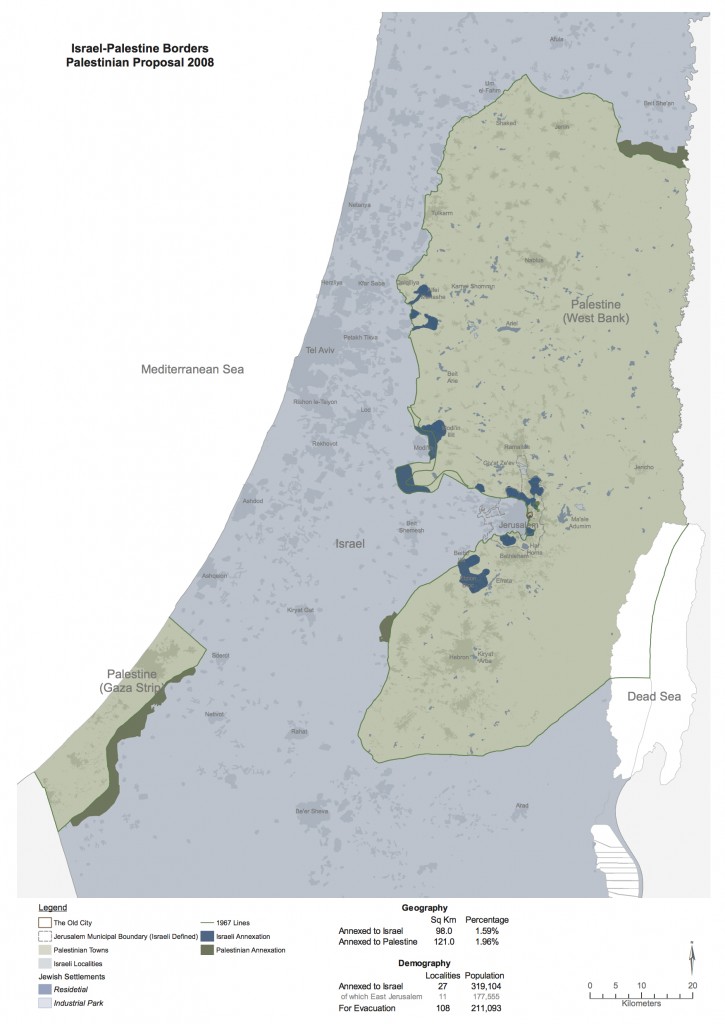
Palestinian proposal on borders (versus Israeli proposal above) in 2008 Olmert-Abbas negotiations; a 2% land swap versus 6 to 7%.
This statement by Americans for Peace Now (reacting to Netanyahu’s settlement bloc negotiations gambit) is consistent with my post last week on negotiating mutually-agreed boundaries to the settlement blocs as integral to establishing a two-state solution. APN endorses the Clinton Parameters and the Geneva Initiative in its penultimate paragraph — both of which favor this approach:
We believe that an Israel-Palestine two-state initiative in the United Nations Security Council, led by the Obama Administration, or formulated in cooperation with key international partners, would be a powerful vehicle for such an articulation. Such an initiative should be undertaken as soon as possible, as developments on the ground every day render the prospects for a two-state solution more remote. Such a resolution should lay out clear parameters for a future Israeli-Palestinian two-state agreement, grounded in the Clinton Parameters, consistent with an outcome along the lines of the Geneva Initiative, and supportive of broader Israeli-Arab peace based on the Arab Peace Initiative. . . .
Also last week, the Israel Policy Forum hosted an “on-the-record” teleconference with Dan Rothem, a “Senior Policy Consultant” for the S. Daniel Abraham Center for Middle East Peace. Rothem is an authority on maps and demographics related to the various proposals advanced by Israel and the PLO in previous rounds of negotiations — especially the Olmert-Abbas round that culminated in 2008.
He was most illuminating on the different Israeli and Palestinian conceptions of acceptable boundaries to the settlement blocs. (See maps displayed at the Abraham Center website.)
Olmert’s proposal was for Israel to annex 6-7% of Palestinian territory with 70,000 Israelis to be evacuated; the Abbas proposal was for 2%, with 210,000 to be evacuated. The difference, says Rothem, is what needs to be negotiated over. Rothem refers to the Geneva Initiative of 2003 and David Makovsky’s study of 2011, for the Washington Institute for Near East Policy, as meaningful quests for compromise.





What people are cautious about, I believe (and should be), is that Bibi is offering to negotiate the blocs but not an overall settlement. In fact, he isn’t even making it clear that a blocs negotiation would advance the path towards a Palestinian State. Further, without knowing many other things — e.g., is Israel committed to territorial contiguity in a Palestinian state, is Israel keeping the Jordan Valley? how are the Palestinians to know how expansive a set of bloc boundaries to agree to? What are they getting overall? Not a word on this from Bibi.
To my mind, this is a typical, cynical Bibi ploy: if the Palestinians negotiate over this, he looks good and either wastes time as usual or secures expansive bloc boundaries while not committing to a Palestinian State…and he gets the world off his back for a while. If the Palestinians don’t engage about the blocs on his terms, they look like they’re “uninterested” in “peace” and he can reinforce the mantra that “there’s no partner for peace.”
Bibi should be pressed by DC, the EU and by people like us to spell out the context and end goal for these bloc talks: are the Palestinians going to be negotiating the definitive giveaway of part of Mandate Palestine or are they on the road to drawing borders for their own state? And we still need to know Bibi’s intentions about the Jordan Vallely that is so important economically and strategically for any Palestinian State.
P.S. Bibi’s new “interest” in the Arab Peace Initiative is also problematic. He says he accepts its basic principle…that there should be a settlement between Israel and the Arab countries. But the Initiative’s actual basic principle is that such a settlement would be possible only in the context of end of occupation and rise of a Palestinian State. Again, he makes himself look good while avoiding the basics. DC, the EU and people like us should lean on the Arab League immediately to invite Bibi to send a high level delegation to open exploratory talks on the Initiative. It will be much, much harder for him to engage in “process but no peace” with the League than with the PA.
I agree fully with Ed Goldstein. What makes Bibi’s initiative “phony” is precisely the absence of any offer of a state to the Palestinians with it. Boundaries to the settlement blocs without the Palestinian state are boundaries only between Israel and Israeli territory, no better than municipal boundaries which characteristically the city expands beyond and then annexes the new territory as it gets developed. How is that different from the status quo?